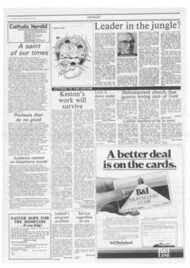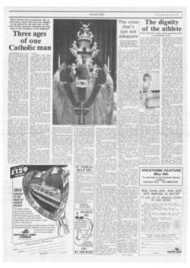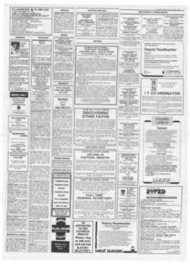Page 5, 20th April 1990
Page 5

Report an error
Noticed an error on this page?If you've noticed an error in this article please click here to report it.
Tags
Share
Related articles
White Church Or Black?
Films By Freda Bruce Lockhart
A Good-tempered
Column
Can The Ballot Box Still Pull Ireland Round?
The cross that's just not adequate
As local government elections approach in May, Bernard Black on his ballot box hopes
ONE of my childhood recollections is the disgruntled reaction of my godfather when, from the pulpit the Sunday before the general election, the priest highlighted the fact that the Conservative candidate was a Catholic, adding that it was important to have more Catholics in positions of influence in the country. My godfather was both a Catholic and a Labour supporter.
In the event the sitting Labour MP was re-elected despite the priest's efforts, but some years later he resigned to force a by-election because he didn't want this country involved , in the manufacture of hydrogen bombs. The campaign was overtaken by a general election, and by standing as an independent against nuclear weapons, our erstwhile MP split the Labour vote and helped the Conservative candidate to win.
From that moment on I always felt that the single cross on the ballot paper, introduced in the nineteenth century when many were illiterate, was a woefully inadequate method of giving the power to the people which democracy is supposed to be about. In a representative democracy, the way in which representatives are elected is crucial.
What is wrong with our current system is that we have a party list of one. Each party puts up just one candidate. In about 450 of the 650 constituencies the seat is "safe" for one or other of two parties, one of which is certain to be the government after the election and the other Her Majesty's Opposition.
Many consequently see the election as just that — the election of a government. Some even portray it as a presidential type contest between the Prime Minister and the Leader of the Opposition. Yet no government at a general election since 1935 has obtained a majority of the votes cast. In 1951 and in February 1974 the party which polled the most votes — Labour and the Conservatives respectively — lost the election.
Because of the fear of splitting the vote, Conservatives are not given an opportunity to express a preference for a "Thatcherite" or a candidate who is "not one of us", and Labour supporters cannot choose a "moderate" or a "militant".
At every general election about half those who vote elect no one. In the first of the two elections in 1974 and again in 1983, the majority of those who voted elected no one.
This lack of electoral power for voters is a contributory factor to people's general disenchantment with politics and politicians. Frequently those who are elected are perceived as promising one thing before and during a general election, and then performing quite differently after it. "Politics" becomes a dirty word, Conversely, to do something in a "democratic" way is regarded as a basis for approval. Sadly, although Westminster is regarded as both a "model" and the "mother of parliaments" not one other European country chooses to elect its legislature in the way in which we do.
Voting, since the Ballot Act of 1872, has rightly been secret, but secrecy for the voters is one thing. Not being able to ask candidates to stand up and be counted to some effect is something else, and it is long
since past the time when those who are concerned about moral issues, for instance, should be able to express a meaningful preference when they go to the polls.
Those who join such a clamour should unite on the method. As nothing secures defeat more quickly in politics than division, it would be as well to opt for what the Electoral Reform Society of Great Britain and Ireland describes as the
"best system" and has its principal objective the single transferable vote in multimember constituencies.
It will involve the amalgamation of the current 650 single member constitutencies in Britain into a smaller number of larger but
moderately-sized multi-member constituencies returning on average five MPs without any increase in their total number.
Voters will have the elective cont'd on page six
blog comments powered by Disqus











